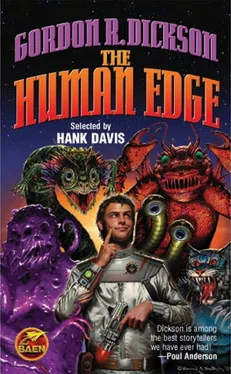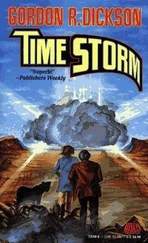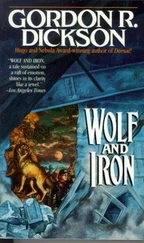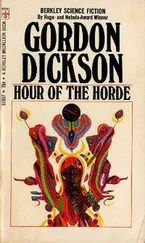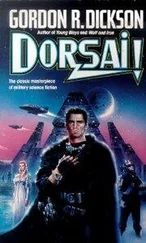“I am sorry. I do not have that information.”
“Yeah. Well, stand by to translate.” Hank keyed in the communicator board. A screen before him lit up with the image of a hairless individual, lacking even eyebrows; with pronounced bony brow ridges, a wide mouth, no chin to speak of, and what appeared to be a turtleneck sweater drawn high on a thick neck.
This individual stared for a long second; and then began to gobble at him. Eventually he ran down and went back to staring again. Hank, his finger still off the send button, turned to the library.
“What’d he say?”
“I will need more referents. Possibly if you speak now, he will perhaps speak again.”
“Not on your life.” Hank looked at the alien. The alien looked back. The staring match went on for some time. Abruptly the alien started gobbling again. He gobbled for some time, this time. He also waved a fist in the air. It was a rather slim fist considering the thickness of his neck.
“Well?” demanded Hank of the library, after the figure in the screen had fallen silent a second time.
“First message: ‘You are under arrest.’”
“That’s all he said?”
“Agglutination appears to be a prime characteristic of his language.”
“All right—” growled Hank. “Go on.”
“Second message: ‘You have offended the responsible authorities and their immediate representative, in the person of I who address you. You are arrested and helpless. Submit therefore immediately or you will be utterly destroyed.’”
Hank thought for a minute.
“Translate,” he said to the library. He pressed the send button. “Tut-tut!” he said to the alien.
“I am unable to translate ‘tut-tut,’” said the library.
“Oh?” Hank grinned. His grin widened. He began to laugh. He laughed louder.
“I am unable to translate laughter,” said the library.
Hank was rolling around in his seat and hiccuping with helpless merriment. He reached out with one hand and slapped the send button to off. The screen went dark before him as the still-blankly staring alien faded from view. Whooping, Hank pulled himself to an upright position. Abruptly he stopped.
“What am I doing?” he muttered. “The set’s off now.” He wiped a damp forehead with the hairy back of one large hand and got up to totter over to one of the food compartments. He opened it and hauled out a large brown bottle.
Liquor was not a normal part of the supply list on scout ships—for reasons of space, rather than those of sobriety, a drinking world scout being a sort of self-canceling problem. On the other hand, a closed cycle that reprocessed waste matter of an organic nature and started it around again to become food required efficient little manufactories that were quite as capable of turning out ersatz beer as ersatz steak. The result was that world scouts were beer drinkers if they were any sort of drinkers at all.
They were also the despair of waiters, waitresses, and bartenders. A group of world scouts spending a social moment together would order a bottle apiece of cold beer; drain their bottles, when they came, in a couple of seconds; and then sit with the empty bottles before them, refusing to reorder until about forty-five minutes had passed. Then the whole process would be repeated.
A world scout determined to get drunk merely shortened the interval between bottles. One determined to stay cold sober, while appearing to drink, lengthened it. A member of the laity, sitting in with them on these sessions, was normally destroyed—either by drink or frustration.
In this particular case Hank flipped the seal off the top of the bottle in his hand, poured half a liter of beer down his throat, carefully resealed the bottle and put it back in its refrigerator compartment. He then carefully counted the remaining full containers of beer in the compartment and set the beer-producing controls on high.
After this he was almost attacked by another spasm of laughter, but he fought it down. He went over to the desk of controls and flicked on an outside screen. It lit up with a view of the meadow with the afternoon sun beaming down on the soft grass and the tall gunmetal-colored shape of the alien ship.
“A beautiful day,” said Hank aloud, “for a picnic.”
“Do you wish me to make a note of that fact?” inquired the library, which had been left on.
“Why not?” said Hank. He went cheerfully about the room, opening lockers and taking things out. A sudden thought occurred to him. He went across to the desk controls to check the readings on certain instruments concerned with the physical environment of the world outside—but these gave the meadow a clean bill of health. He added the full bottles of beer to his pile, enclosing them in a temperature bag, and headed out the air lock of his ship.
Reaching the ground outside, he proceeded to a comfortable spot on the grass and about midway between his ship and that of the alien.
* * *
Half an hour later, he had a cheerful small fire going in the center of a small circle of stones, a hammock hung on wooden posts, and small conveniences such as a beer-cooler and an insulated box of assorted snacks within easy reach. He lay in the hammock and strummed his guitar and sang. He also swallowed a half liter of beer approximately every thirty-five minutes.
The beer did nothing to improve his voice. There was a reason Hank Shallo sang while off on his lonely trips of exploration—no civilized community could endure the horrendousness of his vocal cords when these vibrated in song. By a combination of bribery and intimidation he had forced an indigent music instructor once to teach him how to stay in key. So, stay in key he did; but the result was still a sort of bass bray capable of penetrating six-inch walls and rattling windows.
The alien ship showed no sign of life.
As the sun began slowly to drown itself in twilight, however, Hank became aware to his pleasant surprise that the local inhabitants of this world did not seem to join most of the rest of the galaxy in its disdain for his singing. An assortment of small animals of various shapes and sizes had gathered around his camping spot and sat in a circle. He was not unduly surprised, what with the beer he had drunk and all, when after a little while one of the larger creatures—a sort of rabbit-shaped beast sitting up on its hind legs—began to harmonize with him.
If Hank’s voice had somewhat the sonority of a cross-cut saw, the beast’s had the pure liquidity of an angel’s. They were rendering a remarkable performance, albeit four octaves apart—and it had grown rather dark—when a blinding light burst suddenly into being from the top of the alien ship. It washed the meadow in a brilliance like that of an atomic flare; and the native animals took to their heels. Sitting up in the hammock and blinking, Hank saw the alien approaching him on foot. The alien was pushing a black box the size of a suitcase on two wheels. He trundled it up to the campfire, hitched up the floppy, black, bell-bottomed trousers which supplemented the turtle-necked upper garment Hank had remarked on the screen earlier, and gobbled at Hank.
“Sorry, buddy,” said Hank. “I haven’t got my translator with me.”
The alien gobbled some more. Hank idly strummed a few stray chords and regretted the fact that he hadn’t gotten the native animal to harmonizing with him on “Love’s Old Sweet Song,” which would have been ideally suited to their two voices together.
The alien stopped gobbling and jabbed one finger—somewhat angrily, it seemed to Hank, down on a button on top of the black box. There was a moment’s hesitation; then he gobbled again and a curiously flat and unaccented English came out of the box.
Читать дальше
